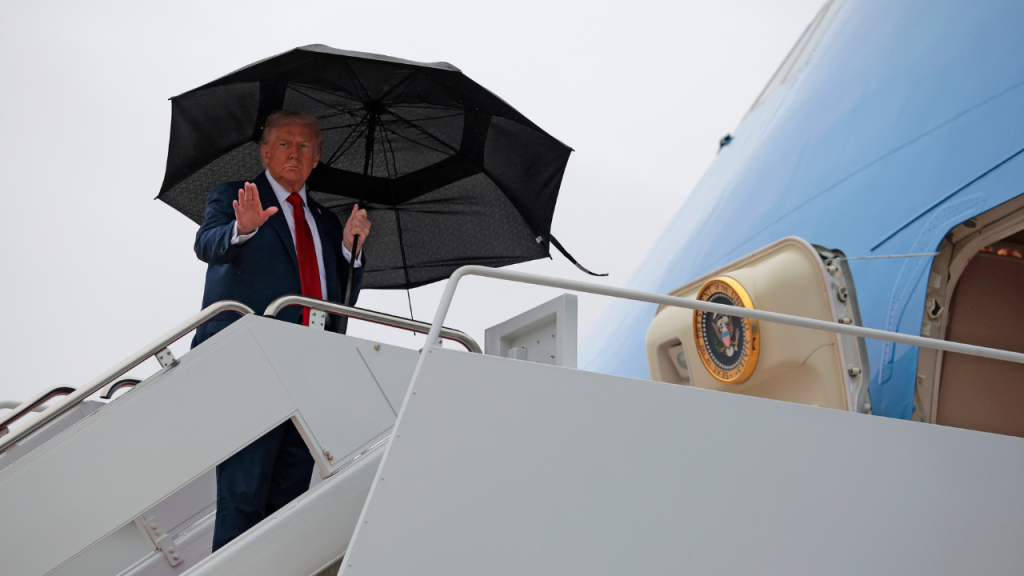Trump’s Historic Middle East Peace Mission
In a swift diplomatic mission, President Donald Trump is set to make history in the Middle East as he oversees a landmark peace agreement between Israel and Hamas. This monumental deal is expected to end the devastating two-year war in Gaza and secure the release of all remaining hostages. With characteristic confidence before boarding Air Force One, Trump shared optimistic news with reporters, suggesting the hostages might return home even sooner than anticipated and praising Israeli Prime Minister Benjamin Netanyahu for his crucial role in facilitating the agreement.
“The war is over,” Trump declared decisively at Joint Base Andrews before beginning his nearly 12-hour flight to Israel. His whirlwind itinerary in Israel includes emotional meetings with families of hostages and a significant address to the Knesset, Israel’s parliament, in Jerusalem. The presidential schedule underscores the gravity of this diplomatic achievement, balancing symbolic gestures with practical negotiations in a region long plagued by conflict. This peace initiative represents one of the most significant diplomatic breakthroughs in recent Middle Eastern history, potentially reshaping regional dynamics for years to come.
Following his brief but consequential visit to Israel, Trump will travel to Egypt’s picturesque seaside city of Sharm el-Sheikh, joining more than twenty world leaders at an international summit dedicated to finalizing the Gaza peace agreement. This gathering, scheduled for Monday, marks an extraordinary convergence of global diplomacy aimed at cementing sustainable peace in one of the world’s most volatile regions. The Egyptian-hosted summit serves as the formal conclusion to months of behind-the-scenes negotiations, representing a rare moment of international consensus on the path forward for Gaza and its people.
Despite the monumental importance of this overseas mission, Trump has structured his trip with remarkable brevity. After just a handful of hours in Israel and Egypt—hours that may reshape the future of the Middle East—the President will board Air Force One for Washington, determined to return to the White House by early Tuesday morning. This compressed schedule reflects Trump’s commitment to honoring another significant priority: bestowing the Presidential Medal of Freedom, America’s highest civilian honor, posthumously upon Charlie Kirk, the influential conservative activist and founder of Turning Point USA who was tragically assassinated just weeks ago.
“It’s a very quick trip, but I’ll be making two major stops, and then I’ll be on the plane trying to get back in time for Charlie,” Trump explained to reporters at the White House on Friday, highlighting the East Room celebration planned at the White House. The timing of the ceremony holds particular significance, as it coincides with what would have been Kirk’s 32nd birthday on October 14th. Kirk, who gained national recognition for his signature political debates on college campuses and his organization’s conservative advocacy, was killed on September 10th during an outdoor event at Utah Valley University—the planned first stop on Turning Point USA’s “American Comeback Tour.”
The tremendous impact of Kirk’s life and work was powerfully demonstrated at his memorial service, which drew approximately 90,000 people to State Farm Stadium in Glendale, Arizona, and nearby overflow venues—one of the largest public turnouts ever recorded for a private citizen. Trump had announced last month his intention to award Kirk this prestigious honor posthumously, a decision that reflects both personal respect and acknowledgment of Kirk’s significant influence on conservative politics and youth engagement. The juxtaposition of Trump’s Middle East peace mission with this solemn domestic ceremony illuminates the multifaceted nature of presidential leadership—bridging international diplomacy and national commemoration, war and peace, tragedy and hope.















